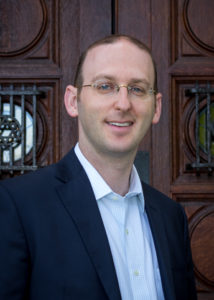 As we are about to begin our month of holidays, the parashah we read this Shabbat – Parashat Nitzavim – has an important message to bear in mind.
As we are about to begin our month of holidays, the parashah we read this Shabbat – Parashat Nitzavim – has an important message to bear in mind.
For this commandment that I command you today, it is not hidden from you and it is not distant. It is not in the heavens, [for you] to say, “Who can ascend to the heavens for us and take it for us, and let us hear it, so that we can perform it?” Nor is it across the sea, [for you] to say, “Who can cross to the other side of the sea for us and take it for us, and let us hear it, so that we can perform it?” Rather, the matter is very near to you, in your mouth and in your heart, to perform it.
With the sound of the shofar on Rosh Hashanah, we are encouraged to reflect on our actions and behaviors of the past year and to find ways in which we can do better. God is not looking for opportunities to punish; rather He is waiting for any small indication that we recognize there is always room for improvement and that our intention is to strive for these improvements.
From these verses, we learn that the person we wish to be – and whom God wishes us to be – is always within our reach. We only need to be mindful of what is in our hearts and how we show that to the world.
We are honoured and grateful this week to feature Rabbi Scheier of the Shaar Hashomayim synagogue on our Jewish Journey Blog with a Rosh Hashanah message and a very simple way to start the New Year with positive and meaningful intentions – in your mouth and in your heart.
I wish you all a Shabbat Shalom, and a Shana Tova u-Metuka – a happy, healthy and sweet New Year.
Debbie
Rosh Hashanah Message from Rabbi Scheier
 As Rosh Hashana approaches, we exchange our unique Jewish version of “season’s greetings.” We say, l’shana tova techatevu – may you been inscribed (in the Book of Life) for a good year. Interestingly, this wish differs from secular New Year’s greetings, when we wish each other a “Happy New Year.” Our blessing for the Jewish New Year is not for happiness; rather, we pray for ‘goodness,’ shana tova.
As Rosh Hashana approaches, we exchange our unique Jewish version of “season’s greetings.” We say, l’shana tova techatevu – may you been inscribed (in the Book of Life) for a good year. Interestingly, this wish differs from secular New Year’s greetings, when we wish each other a “Happy New Year.” Our blessing for the Jewish New Year is not for happiness; rather, we pray for ‘goodness,’ shana tova.
Perhaps this unique Jewish expression can be attributed to the fleeting nature of happiness. As a wise person once said, The pursuit of happiness doesn’t achieve our goals; however, the pursuit of our goals often achieves happiness. Therefore, instead of happiness, we embrace the goodness of our worthy goals and ambitions.
In many prayer books, this wish – to be inscribed for a good year – is found in the pages after the evening service on the first night of Rosh Hashana. A few years ago, I pointed these words out to my congregation, and I emphasized that these first moments of a new year offer us an opportunity to begin the year on solid footing, and that the first words we exchange to each other should be done thoughtfully and purposefully. I then encouraged those present to keep this lesson in mind as they went home to their families, and to ensure that the first words exchanged in the New Year were words of blessing and love.
A few days later, I received an extraordinary phone call. The woman who called explained that I didn’t know her personally, but she and her teenage daughter had been sitting in the back of the congregation when I taught about the importance of the year’s first words. She said, “My daughter and I have had a difficult relationship in this last while, and I was relieved that she agreed to come to services with me. And when you taught us about the importance of the year’s first words, my daughter turned to me and said, ‘I love you, Mom. Thank you for everything you do for me. I want those to be my first words of the year.’”
I remember this mother and daughter each year, as I think about my own first words. In those first moments of Rosh Hashana, as we bless and converse with our children, parents, spouses, siblings, and friends, the opportunities afforded to us by a new beginning in the New Year provide new openings for closeness and love.
May it be a year of goodness and blessing for the Akiva School family!
Rabbi Scheier












